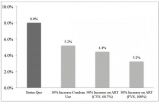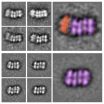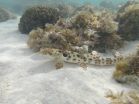(Press-News.org) Our mood can affect how we walk — slump-shouldered if we're sad, bouncing along if we're happy. Now researchers have shown it works the other way too — making people imitate a happy or sad way of walking actually affects their mood.
Subjects who were prompted to walk in a more depressed style, with less arm movement and their shoulders rolled forward, experienced worse moods than those who were induced to walk in a happier style, according to the study published in the Journal of Behavior Therapy and Experimental Psychiatry.
CIFAR Senior Fellow Nikolaus Troje (Queen's University), a co-author on the paper, has shown in past research that depressed people move very differently than happy people.
"It is not surprising that our mood, the way we feel, affects how we walk, but we want to see whether the way we move also affects how we feel," Troje says.
He and his colleagues showed subjects a list of positive and negative words, such as "pretty," "afraid" and "anxious" and then asked them to walk on a treadmill while they measured their gait and posture. A screen showed the subjects a gauge that moved left or right depending on whether their walking style was more depressed or happier. But the subjects didn't know what the gauge was measuring. Researchers told some subjects to try and move the gauge left, while others were told to move it right.
"They would learn very quickly to walk the way we wanted them to walk," Troje says.
Afterward, the subjects had to write down as many words as they could remember from the earlier list of positive and negative words. Those who had been walking in a depressed style remembered many more negative words. The difference in recall suggests that the depressed walking style actually created a more depressed mood.
The study builds on our understanding of how mood can affect memory. Clinically depressed patients are known to remember negative events, particularly those about themselves, much more than positive life events, Troje says. And remembering the bad makes them feel even worse.
"If you can break that self-perpetuating cycle, you might have a strong therapeutic tool to work with depressive patients."
The study also contributes to the questions asked in CIFAR's Neural Computation & Adaptive Perception program, which aims to unlock the mystery of how our brains convert sensory stimuli into information and to recreate human-style learning in computers.
"As social animals we spend so much time watching other people, and we are experts at retrieving information about other people from all sorts of different sources," Troje says. Those sources include facial expression, posture and body movement. Developing a better understanding of the biological algorithms in our brains that process stimuli — including information from our own movements — can help researchers develop better artificial intelligence, while learning more about ourselves in the process.
INFORMATION:
Publication
Michalak, J., Rohde, K., Troje, N. F. (2015), "How we walk affects what we remember: Gait modifications through biofeedback change negative affective memory bias," Journal of Behavior Therapy and Experimental Psychiatry 46:121 - 125 (2014).
About CIFAR
CIFAR creates knowledge that will transform our world. The Institute brings together outstanding researchers to work in global networks that address some of the most important questions our world faces today. Our networks help support the growth of research leaders and are catalysts for change in business, government and society.
Established in 1982, CIFAR is a Canadian-based, global organization, comprised of nearly 350 fellows, scholars and advisors from more than 100 institutions in 16 countries. CIFAR partners with the Government of Canada, provincial governments, individuals, foundations, corporations and research institutions to extend our impact in the world.
Contacts
Lindsay Jolivet
Writer & Media Relations Specialist
Canadian Institute for Advanced Research
lindsay.jolivet@cifar.ca
(416) 971-4876
Nikolaus Troje
CIFAR Senior Fellow
Queen's University
troje@queensu.ca
(613) 533-6017
Rochester, Minn. – The American Academy of Neurology (AAN) and the American Association of Neuromuscular & Electrodiagnostic Medicine (AANEM) offer a new guideline on how to determine what genetic tests may best diagnose a person's subtype of limb-girdle or distal muscular dystrophy. The guideline is published in the October 14, 2014, print issue of Neurology®, the medical journal of the AAN.
Researchers reviewed all of the available studies on the muscular dystrophy, a group of genetic diseases in which muscle fibers are unusually susceptible to damage, as ...
COLUMBIA, Mo. – According to the Centers for Disease Control and Prevention (CDC), many teens skip breakfast, which increases their likelihood of overeating and eventual weight gain. Statistics show that the number of adolescents struggling with obesity, which elevates the risk for chronic health problems, has quadrupled in the past three decades. Now, MU researchers have found that eating breakfast, particularly meals rich in protein, increases young adults' levels of a brain chemical associated with feelings of reward, which may reduce food cravings and overeating ...
PROVIDENCE, R.I. [Brown University] — To address the HIV epidemic in Mexico is to address it among men who have sex with men (MSM), because they account for a large percentage of the country's new infections, says Omar Galárraga, assistant professor of health services policy and practice in the Brown University School of Public Health.
A major source of the new infections is Mexico City's male-to-male sex trade, Galárraga has found. In his research, including detailed interviews and testing with hundreds of male sex workers on the city's streets and in ...
Coordinating product placement with advertising in the same television program can reduce audience loss over commercial breaks by 10%, according to a new study in the Articles in Advance section of Marketing Science, a journal of the Institute for Operations Research and the Management Sciences (INFORMS).
Synergy or Interference: The Effect of Product Placement on Commercial Break Audience Decline is by David A. Schweidel, Associate Professor of Marketing at Goizueta Business School, Emory University, Natasha Zhang Foutz, Assistant Professor of Marketing at McIntire School ...
UPTON, NY—The proteins that drive DNA replication—the force behind cellular growth and reproduction—are some of the most complex machines on Earth. The multistep replication process involves hundreds of atomic-scale moving parts that rapidly interact and transform. Mapping that dense molecular machinery is one of the most promising and challenging frontiers in medicine and biology.
Now, scientists have pinpointed crucial steps in the beginning of the replication process, including surprising structural details about the enzyme that "unzips" and splits ...
OAK RIDGE, Tenn., Oct. 15, 2014—Researchers at the Department of Energy's Oak Ridge National Laboratory have demonstrated an additive manufacturing method to control the structure and properties of metal components with precision unmatched by conventional manufacturing processes.
Ryan Dehoff, staff scientist and metal additive manufacturing lead at the Department of Energy's Manufacturing Demonstration Facility at ORNL, presented the research this week in an invited presentation at the Materials Science & Technology 2014 conference in Pittsburgh.
"We can now ...
October 15, 2014 – A recently concluded demonstration project made meaningful progress toward introducing a "patient-centered medical home" approach at "safety net" practices serving vulnerable and underserved populations. Lessons learned in the course of developing and implementing the Safety Net Medical Home Initiative (SNMHI) are featured in a special November supplement to Medical Care. The journal is published by Lippincott Williams & Wilkins, a part of Wolters Kluwer Health.
The supplement presents nine original papers sharing "experience and learning" from ...
AMES, Iowa – The stories are shocking and heartbreaking, but they are often disjointed and hard to follow. In severe cases, the narratives are even more chaotic. This is reality for victims of workplace bullying and a major reason why they stay silent, said Stacy Tye-Williams, an assistant professor of communications studies and English at Iowa State University.
No one expects to go to work and feel as though they are back on the school playground, but bullying is all too common for many workers. Approximately 54 million workers, or 35 percent of U.S. employees, ...
A study published online today in the journal Conservation Physiology has shown that the epaulette shark (Hemiscyllium ocellatum) displays physiological tolerance to elevated carbon dioxide (CO2) in its environment after being exposed to CO2 levels equivalent to those that are predicted for their natural habitats in the near future.
Atmospheric CO2 levels have increased by almost 40% in the last 250 years, and the world's oceans have absorbed more than 30% of the additional CO2. The resulting rise in seawater CO2 and associated reduction in pH – known as ocean ...
A shark's habitat can reduce its sensitivity to rising CO2 levels, according to Australian scientists.
Globally, ocean acidification - linked to emissions of greenhouse gases - remains a major concern and scientists say it will harm many marine species over the next century.
Researchers from the ARC Centre of Excellence for Coral Reef Studies (Coral CoE) at James Cook University have found that the epaulette shark, a species that shelters within reefs and copes with low oxygen levels, is able to tolerate increased carbon dioxide in the water without any obvious physical ...





